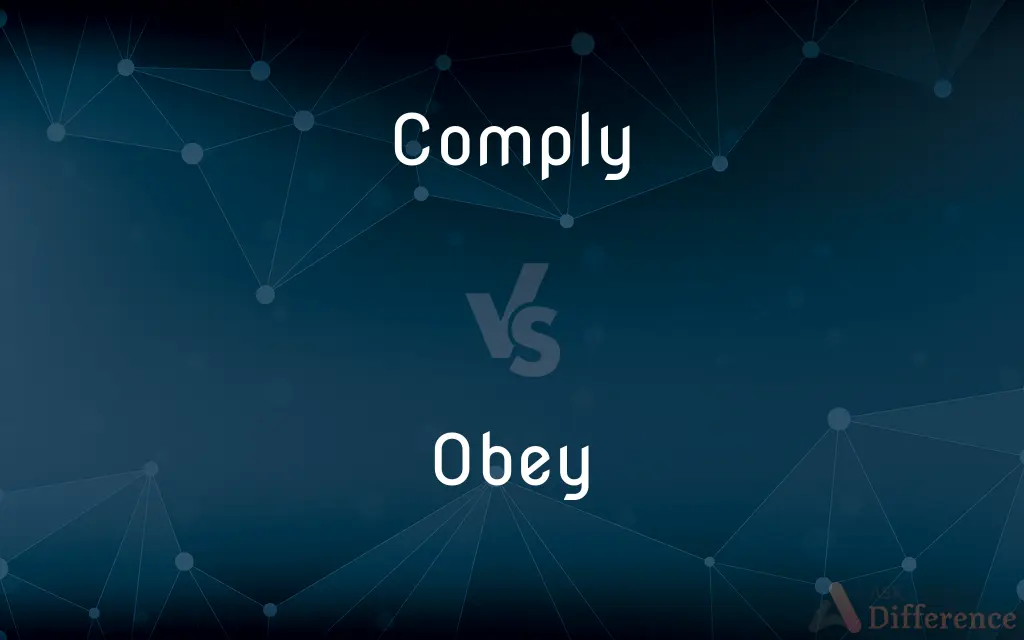Comply vs. Obey — What's the Difference?
Edited by Tayyaba Rehman — By Maham Liaqat — Updated on April 15, 2024
Complying involves adhering to rules or requests, often with flexibility, whereas obeying means following orders or directives strictly, typically from an authority.

Difference Between Comply and Obey
Table of Contents
ADVERTISEMENT
Key Differences
Compliance generally refers to acting according to a request, rule, or regulation, often in a legal or formal context. On the other hand, obedience is more about following direct orders or commands, usually from someone in a position of authority.
When individuals comply, there's usually an element of choice and a sense of voluntary action. Whereas, when they obey, it often implies a compulsory action and a lower degree of personal freedom.
Compliance is often used in contexts where adherence to standards or guidelines is necessary, such as regulatory compliance in business. In contrast, obedience is more commonly associated with personal, military, or religious contexts where strict adherence is crucial.
In terms of nuance, compliance suggests a response to a set of conditions or regulations that may have some room for interpretation. Conversely, obedience implies a clear, direct adherence to instructions without room for interpretation.
The choice of words can indicate the nature of the relationship involved; compliance often exists within a framework where there are consequences for non-compliance, such as legal penalties. Obedience is typically rooted in a hierarchical relationship, where failure to obey might lead to direct personal repercussions.
ADVERTISEMENT
Comparison Chart
Definition
To act according to a request, often voluntarily
To follow orders strictly, often from an authority
Context
Legal, regulatory, corporate
Personal, military, religious
Element of Choice
Yes, often voluntary
No, usually compulsory
Relationship
Guided by rules or regulations
Guided by authority
Consequences
Legal or professional repercussions
Direct personal repercussions
Compare with Definitions
Comply
To conform to a request or command.
We complied with the evacuation order during the drill.
Obey
To submit to authority or control.
Citizens must obey the law.
Comply
To act in accordance with rules or wishes.
The company must comply with the new regulations.
Obey
Acting upon explicit instructions from a figure of authority.
The recruits are trained to obey without delay.
Comply
Acting under terms of a contract or guideline.
Vendors need to comply with our payment terms.
Obey
Adhering to rules without question or hesitation.
Children are taught to obey their parents.
Comply
Meeting requirements in a regulatory environment.
The plant complies with environmental standards.
Obey
To follow the commands or guidance of someone.
The soldier obeys the orders from his superior.
Comply
Adhering to specified standards or conditions.
Employees are expected to comply with office protocols.
Obey
Compliance with commands as a sign of respect.
The followers obey their spiritual leader’s teachings.
Comply
To act in accordance with another's command, request, rule, or wish
The patient complied with the physician's orders.
Obey
To carry out or fulfill the command, order, or instruction of.
Comply
(Obsolete) To be courteous or obedient.
Obey
To carry out or comply with (a command, for example).
Comply
To yield assent; to accord; to acquiesce, agree, consent; to adapt oneself, to conform.
Obey
To behave obediently.
Comply
(archaic) To accomplish, to fulfil.
Obey
(transitive) To do as ordered by (a person, institution etc), to act according to the bidding of.
Comply
(archaic) To be ceremoniously courteous; to make one's compliments.
Obey
(intransitive) To do as one is told.
Comply
(archaic) To enfold; to embrace.
Obey
To be obedient, compliant (to a given law, restriction etc.).
Comply
To yield assent; to accord; agree, or acquiesce; to adapt one's self; to consent or conform; - usually followed by with.
Yet this be sure, in nothing to comply,Scandalous or forbidden in our law.
They did servilely comply with the people in worshiping God by sensible images.
He that complies against his willIs of his own opinion still.
Obey
To give ear to; to execute the commands of; to yield submission to; to comply with the orders of.
Children, obey your parents in the Lord.
Was she the God, that her thou didst obey?
Comply
To be ceremoniously courteous; to make one's compliments.
Obey
To submit to the authority of; to be ruled by.
My will obeyed his will.
Afric and India shall his power obey.
Comply
To fulfill; to accomplish.
Obey
To yield to the impulse, power, or operation of; as, a ship obeys her helm.
Comply
To infold; to embrace.
Seemed to comply,Cloudlike, the daintie deitie.
Obey
To give obedience.
Will he obey when one commands?
His servants ye are, to whom ye obey.
He commanded the trumpets to sound: to which the two brave knights obeying, they performed their courses.
Comply
Act in accordance with someone's rules, commands, or wishes;
He complied with my instructions
You must comply or else!
Follow these simple rules
Abide by the rules
Obey
Be obedient to
Common Curiosities
What does it mean to comply?
To comply means to act in accordance with rules or requests, often with a degree of voluntariness.
Are complying and obeying the same?
No, complying involves a degree of voluntary action and flexibility, while obeying is about strict adherence to directives.
When should someone comply rather than obey?
One should comply when adhering to regulations or formal requests, whereas obedience is required in authoritative relationships.
What are the consequences of failing to obey?
Failing to obey can lead to disciplinary actions, especially in structured environments like the military or within certain familial settings.
Is compliance a legal requirement?
Compliance is often a legal requirement in regulatory environments, ensuring adherence to laws or standards.
What does it mean to obey?
To obey means to follow orders or directives strictly, typically those given by an authority.
Can you obey without complying?
Generally, obeying includes complying, but complying might not necessarily be about obeying, especially if the compliance is voluntary and not directed by an authority.
Can you provide an example of compliance in a business setting?
A business complying with financial reporting regulations is an example of compliance to ensure transparency and accountability.
What is the role of personal judgment in compliance?
Personal judgment plays a role in compliance when interpreting rules or deciding how to meet regulatory standards.
Why is obedience important in military contexts?
In military contexts, obedience is crucial for discipline, coordination, and the effective functioning of a unit.
What are the consequences of non-compliance?
Non-compliance in a business can lead to legal penalties, fines, or loss of licenses.
Is it possible to obey partially?
Typically, obedience requires full adherence to orders; partial obedience might be considered disobedience in strict contexts.
How does culture affect obedience?
Cultural norms and values can significantly influence the extent and manner in which individuals obey authority.
Can a person be legally forced to comply?
Yes, legal mechanisms can force an individual or organization to comply with specific regulations or laws.
How do children learn to obey?
Children learn to obey through guidance and instruction from parents, teachers, and other authority figures, often reinforced by societal norms.
Share Your Discovery

Previous Comparison
Involve vs. Relate
Next Comparison
Bloke vs. ChapAuthor Spotlight
Written by
Maham LiaqatEdited by
Tayyaba RehmanTayyaba Rehman is a distinguished writer, currently serving as a primary contributor to askdifference.com. As a researcher in semantics and etymology, Tayyaba's passion for the complexity of languages and their distinctions has found a perfect home on the platform. Tayyaba delves into the intricacies of language, distinguishing between commonly confused words and phrases, thereby providing clarity for readers worldwide.















































